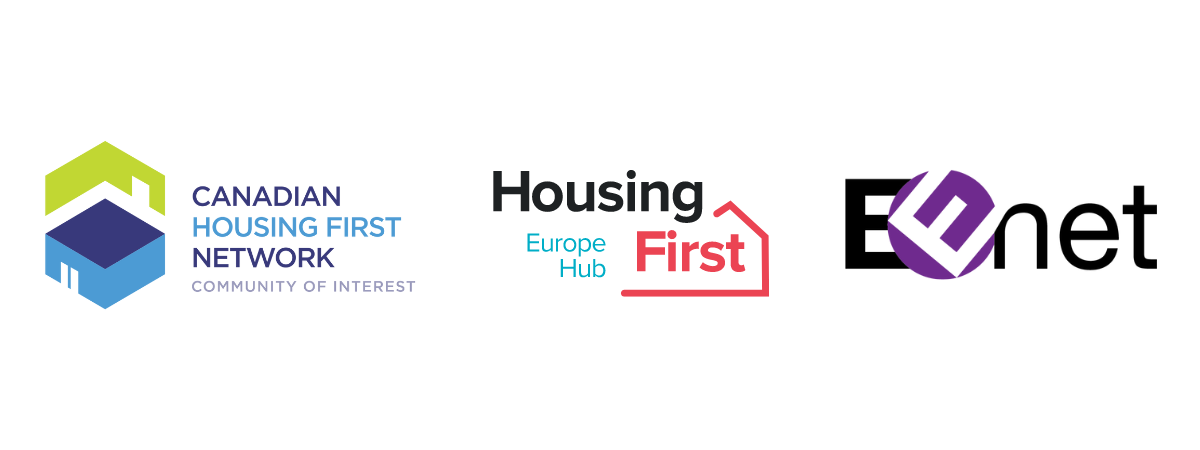About the webinar
Watch this webinar to hear from experts and practitioners in Canada and the United Kingdom to help manage hoarding among Housing First clients. This webinar is the sixth in the International Housing First Webinar Series and is presented by EENet, the Canadian Housing First Network and the Housing First Europe Hub.
The presenters will discuss the following topics:
- Understanding hoarding disorder from a mental health and housing perspective. This presentation will include topics such as reducing stigma, raising awareness, team engagement approaches, and the supportive housing approach to hoarding applied by Services and Housing in the Province (SHIP) in Ontario, Canada.
Presenter: Jennifer Brock - Understanding the relationship between homelessness and hoarding, how homelessness contributes to and/or is expressed in hoarding behaviours; treating hoarding as a multi-level problem requiring a variety of strategies and approaches. The presentation will review the types of intervention strategies adopted and the outcomes of a one-year hoarding pilot as evaluated by University of Ottawa.
Presenters: Chioma Obiakor and Greg Saxe - A collaborative approach that the UK agency—P3 Charity—has with other agencies to provide support for high-end hoarding that aims to create a lasting difference. This presentation will explain how this service operates, the approach to receiving referrals, the restorative work with people for up to, and sometimes over, one year, and how the team provides a holistic approach to match individual needs. This presentation will describe some real-world cases.
Presenter: Fraser MacKinnon
Presenters
Fraser MacKinnon works for P3 Charity. He is the senior support worker running the Warwickshire and Redditch hoarding service in the West Midlands in the UK. With a background in healthcare and homelessness prevention, Fraser is passionate about his community and supporting people to improve their lives and opportunities.
Jennifer Brock is a registered social service worker and Hoarding Specialist Lead with Services and Housing In the Province (SHIP). Over the past 6 years, she has worked extensively with the people who hoard, providing front-line housing and case management support. She also provides educational training opportunities to local service providers. She is passionate about assisting teams and communities with improving service delivery within the Peel, Dufferin, West Toronto and Waterloo Regions in Ontario, Canada.
Chioma Obiakor is the Programme Coordinator for the Hoarding Assistance Team at Options Bytown in Ottawa, Canada. She holds a Social Worker Diploma and a Master of Business Administration. Her experiences in the social service sector include working as an assistant manager in transitional shelter services, a case manager, a shelter support worker, and a community outreach worker. She currently co-chairs the Ottawa Hoarding Response Coalition, collaborating with partner agencies to prevent evictions and homelessness in Ottawa.
Greg Saxe is a case manager for the Hoarding Assistance Team at Options Bytown in Ottawa, Canada. He has a degree in Ethics and over 22 years of experience working with adults with acquired brain injury, youths at risk, and adults with hoarding behaviour. Greg co-facilitated the Buried in Treasures workshop, a 16-week treatment programme, and provides one-on-one support to individuals living with hoarding behaviours who are at risk of losing their housing. Greg’s work also includes writing mediation agreements in landlord-tenant disputes and providing crisis intervention.
Organisers

Canadian Housing First Network – Community of Interest
The Canadian Housing First l Network – Community of Interest (CHFN-COI) assists communities across Canada to develop, evaluate, and improve Housing First (HF) programmes based on the Pathways model tested, adapted, and shown to be effective in the At Home / Chez Soi Demonstration Project.
The CHFN-CoI (formerly the Ontario Housing First Regional Network Community of Interest (OHFRN-CoI)), consist of HF champions, HF programmes across Canada, policy-makers planners, managers, service providers, researchers, and persons with lived experience, including representatives from the housing, health, and justice sectors and Indigenous housing and support providers.
The CHFN is hosted by the Canadian Alliance to End Homelessness (CAEH) and Evidence Exchange Network (EENet) at the Centre for Addiction and Mental Health.
Housing First Europe Hub
The Housing First Europe Hub was established in 2016 by the Y-Foundation (Finland) and FEANTSA (the European Federation of National Organisations Working with Homeless People) along with more than 15 partners. Since then, the Hub has grown to include more than 37 organisations, cities, government ministries, housing providers and researchers from across Europe and beyond.
The Hub works in partnership with core and associate partners to promote Housing First as the first and central response to homelessness.
Evidence Exchange Network
Evidence Exchange Network (EENet) is part of the Knowledge Mobilisation portfolio in the Centre for Addiction and Mental Health’s (CAMH) Provincial System Support Programme (PSSP). EENet moves evidence to action to improve programming and inform policy change.
Our team works closely with researchers, clinicians, policymakers, system planners, service providers, and people with lived experiences to mobilise knowledge and help people connect with each other.